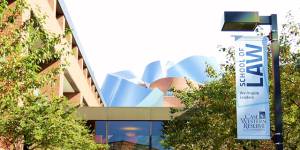Hey everybody.
I was wondering if there are any schools in Canada which offer a two-year LLB for foreign lawyers? Do Canadian law schools give advanced standing to those with degrees from foreign jurisdictions? I will be attending Georgetown for an LLM, but I am beginning to question the utility of this degree in terms of Canadian job prospects....
thanks.
2 year LLB for Foreign Lawyers? (Canada)
Posted Apr 29, 2007 06:49
I was wondering if there are any schools in Canada which offer a two-year LLB for foreign lawyers? Do Canadian law schools give advanced standing to those with degrees from foreign jurisdictions? I will be attending Georgetown for an LLM, but I am beginning to question the utility of this degree in terms of Canadian job prospects....
thanks.
Posted Apr 29, 2007 19:54
Hi,
The is no 2 year LL.B. program for foreign graduates at any Canadian law school. Your foreign credentials will be evaluated by the National Committee on Accreditation (NCA). Once your credentials have been evaluated by the NCA then there are three options for foreign graduates:
First, you can obtain a "certificate of qualification" by attending a Canadian law school as a non-degree student for one or two years (usually two) and completing required courses. However, you do not obtain a Canadian law degree and not all Canadian law schools accept NCA students.
Second, you can complete a set number of challenge exams based on your NCA assessment. You will almost always have to write between 8-12 exams (usually 11 or 12). However, these exams are only offered two times per year, so you will not be able to complete them in one year. It would almost certainly take you two years to complete all of these exams, hence most foreign students prefer the first option of obtaining a certificate of qualification from a Canadian law school instead.
Finally, you can choose to apply as a first year student for the LL.B. and compete with everyone else for being accepted. Competition is extremely competitive and will require a very good GPA and decent LSAT score. The length of the degree is 3 years full-time. The benefit of this option is that you obtain a Canadian law degree but you essentially start over. However, I know many foreign students who attempt this route since its only an extra year for most.
These are the only options that foreign students have in order to qualify for the Bar exam in a Canadian province and be able to participate in an article of clerkship.
The is no 2 year LL.B. program for foreign graduates at any Canadian law school. Your foreign credentials will be evaluated by the National Committee on Accreditation (NCA). Once your credentials have been evaluated by the NCA then there are three options for foreign graduates:
First, you can obtain a "certificate of qualification" by attending a Canadian law school as a non-degree student for one or two years (usually two) and completing required courses. However, you do not obtain a Canadian law degree and not all Canadian law schools accept NCA students.
Second, you can complete a set number of challenge exams based on your NCA assessment. You will almost always have to write between 8-12 exams (usually 11 or 12). However, these exams are only offered two times per year, so you will not be able to complete them in one year. It would almost certainly take you two years to complete all of these exams, hence most foreign students prefer the first option of obtaining a certificate of qualification from a Canadian law school instead.
Finally, you can choose to apply as a first year student for the LL.B. and compete with everyone else for being accepted. Competition is extremely competitive and will require a very good GPA and decent LSAT score. The length of the degree is 3 years full-time. The benefit of this option is that you obtain a Canadian law degree but you essentially start over. However, I know many foreign students who attempt this route since its only an extra year for most.
These are the only options that foreign students have in order to qualify for the Bar exam in a Canadian province and be able to participate in an article of clerkship.
Posted Apr 30, 2007 06:22
The benefit of this option is that you obtain a Canadian law degree but you essentially start over. However, I know many foreign students who attempt this route since its only an extra year for most.
thanks for the reply.
I am still a bit confused, however. I would like to obtain a Canadian law degree, I'm just not too keen on committing 3 years to the process. By this last sentence in your reply, does this mean that I would be able to apply as a first-year and obtain a LLB in approximately one year? that would be fantastic if possible...
thanks again.
The benefit of this option is that you obtain a Canadian law degree but you essentially start over. However, I know many foreign students who attempt this route since its only an extra year for most.
</blockquote>
thanks for the reply.
I am still a bit confused, however. I would like to obtain a Canadian law degree, I'm just not too keen on committing 3 years to the process. By this last sentence in your reply, does this mean that I would be able to apply as a first-year and obtain a LLB in approximately one year? that would be fantastic if possible...
thanks again.
Posted Apr 30, 2007 09:11
Hi,
Sorry if there was any confusion. If you want a Canadian law degree you will have to apply to the first year of the LL.B. program. You would have to complete the full three years. There is no other option if you want to obtain a Canadian law degree.
However, if you are just looking for access to the Bar, then a foreign graduate can obtain a certificate of qualification or complete the NCA challenge exams usually in 2 years.
As you can see, it is very difficult for foreign law graduates to be recognized in Canada.
Sorry if there was any confusion. If you want a Canadian law degree you will have to apply to the first year of the LL.B. program. You would have to complete the full three years. There is no other option if you want to obtain a Canadian law degree.
However, if you are just looking for access to the Bar, then a foreign graduate can obtain a certificate of qualification or complete the NCA challenge exams usually in 2 years.
As you can see, it is very difficult for foreign law graduates to be recognized in Canada.
Posted May 01, 2007 14:29
Hi, It is possible to get credits for the courses you've taken on your first law degree. It depends on the university.
I went the Laval University and they gave me 48 credits for my Salvadoran law degree. You need 99 credits to complete the degree so I had almost half of the degree accredited. At Laval a law degree is usually done in 3.5 - 4 years.
I only had to do 2 years but I could have done it earlier if I would have taken more classes every session. It would have been possible for me to do it in 1.5 year taking 3 summer classes and 12 classes during the fall and winter.
The only thing is that I had to learn French since Laval is a French University but I did it because I really wanted to learn French. McGill is the English University in Quebec but their degree is longer because you get a law degree in Common Law and Civil Law.
After finish your degree you still have to pass the Bar, we have to go to Bar school, which can be done either in 4 or 8 months. That's what I am doing right now.
So as everyone before said...it is not easy to practice law in Canada but you can definetely do it.
I went the Laval University and they gave me 48 credits for my Salvadoran law degree. You need 99 credits to complete the degree so I had almost half of the degree accredited. At Laval a law degree is usually done in 3.5 - 4 years.
I only had to do 2 years but I could have done it earlier if I would have taken more classes every session. It would have been possible for me to do it in 1.5 year taking 3 summer classes and 12 classes during the fall and winter.
The only thing is that I had to learn French since Laval is a French University but I did it because I really wanted to learn French. McGill is the English University in Quebec but their degree is longer because you get a law degree in Common Law and Civil Law.
After finish your degree you still have to pass the Bar, we have to go to Bar school, which can be done either in 4 or 8 months. That's what I am doing right now.
So as everyone before said...it is not easy to practice law in Canada but you can definetely do it.
Posted May 02, 2007 04:27
Hi Armando,
I did not include Quebec because of its civil law jurisdiction. Most common law schools in other provinces do not award the advanced credits that you received. Quebec is quite different from the rest of Canada. Laval is a civil law school and civil law schools are different in their assessments and qualifications.
The NCA would be moot if foreign law graduates were awarded advanced credits the same way in the rest of Canada. It should be noted that the NCA does not apply to civil law schools in Quebec. Foreign law graduates applying for advanced standing to common law schools MUST apply through the NCA. This includes McGill but not Laval.
The bottom line is that Quebec is an island onto itself for civil law, but for common law, a foreign law graduate cannot do what Armando did with his civil law degree. For common law, you virtually have to start over in order to be awarded a Canadian LL.B. Some foreign graduates may be exempt from certain elective courses but that would depend on the school.
I did not include Quebec because of its civil law jurisdiction. Most common law schools in other provinces do not award the advanced credits that you received. Quebec is quite different from the rest of Canada. Laval is a civil law school and civil law schools are different in their assessments and qualifications.
The NCA would be moot if foreign law graduates were awarded advanced credits the same way in the rest of Canada. It should be noted that the NCA does not apply to civil law schools in Quebec. Foreign law graduates applying for advanced standing to common law schools MUST apply through the NCA. This includes McGill but not Laval.
The bottom line is that Quebec is an island onto itself for civil law, but for common law, a foreign law graduate cannot do what Armando did with his civil law degree. For common law, you virtually have to start over in order to be awarded a Canadian LL.B. Some foreign graduates may be exempt from certain elective courses but that would depend on the school.
Posted May 10, 2007 17:39
As Wade pointed out above - there seems to be a distinction between getting a Canadian LLB vs. getting called to the bar in a particular province. I'm guessing from your email that you ultimately want to practice law in Canada so you probably want to go the route of figuring out what the law society in the province you intend to practice is going to require that you take in order to be eligible for call to the bar - after all, you already have an LLB.
As described above the law society will send you off to the NCA to determine how many (and which) courses you will need to take to get yourself up to speed on Canadian law.
In this respect, the law society's practice seems discriminatory and might not stand up to a challenge in court. How does it discriminate? By requiring the NCA's recommendations - they in effect require foreign trained lawyers to take courses that Canadian trained students would not have to take. ie certain Canadian LLB programs have very very few compulsory courses and it is thus possible to graduate from Canadian LLB programs without ever taking tax law, the law of evidence (imagine that!), trusts, legal ethics (imagine that too!) and the list goes on and on... friends I know in this situation are always told they need to take a handful of courses including tax, evidence, etc.... If law societies are requiring foreign trained students to take courses that Canadian's don't have to, then in my view - they are on shaky constitutional footing - particularly under s. 15 of the Charter. They make a non-trivial distinction based on (and here is the tricky part) the grounds of the nationality of your educational credentials... legally speaking, to be successful in court the argument would need to establish that 'the nationality of your educational credentials' is either enumerated or analogous grounds protected by the equality provisions under s. 15 of the Charter (see P.W. Hogg's book "Constitutional Law of Canada")
In any event, you might not be interested in a Court challenge - but what better way to get acquainted with the laws of Canada!
Sean
As described above the law society will send you off to the NCA to determine how many (and which) courses you will need to take to get yourself up to speed on Canadian law.
In this respect, the law society's practice seems discriminatory and might not stand up to a challenge in court. How does it discriminate? By requiring the NCA's recommendations - they in effect require foreign trained lawyers to take courses that Canadian trained students would not have to take. ie certain Canadian LLB programs have very very few compulsory courses and it is thus possible to graduate from Canadian LLB programs without ever taking tax law, the law of evidence (imagine that!), trusts, legal ethics (imagine that too!) and the list goes on and on... friends I know in this situation are always told they need to take a handful of courses including tax, evidence, etc.... If law societies are requiring foreign trained students to take courses that Canadian's don't have to, then in my view - they are on shaky constitutional footing - particularly under s. 15 of the Charter. They make a non-trivial distinction based on (and here is the tricky part) the grounds of the nationality of your educational credentials... legally speaking, to be successful in court the argument would need to establish that 'the nationality of your educational credentials' is either enumerated or analogous grounds protected by the equality provisions under s. 15 of the Charter (see P.W. Hogg's book "Constitutional Law of Canada")
In any event, you might not be interested in a Court challenge - but what better way to get acquainted with the laws of Canada!
Sean
Posted Aug 27, 2008 18:42
I feel the NCA's recommendations are discriminatory and lack consistency.
In my case, I completed my LL.B (Hons.) degree in England and applied to the NCA.
Although, I am eager to comply with the NCAs recommendations, it is practically impossible. This is because the NCA recommended me to complete the entire first year at a Canadian law school and to complete additional upper year courses. No law school can admit me as an NCA student, because Canadian law schools cannot accommodate NCA students who are required to complete the entire first year. Furthermore, Canadian law schools have very limited spaces for NCA students and these spaces are usually reserved for upper year studies.
My question is how could the NCA make recommendations that are impossible to follow? Shouldnt their recommendations be in accordance with law school admission guidelines? Was the NCA aware and intentionally made such recommendations knowing the fact that it would be impossible to comply with such recommendations?
I feel hopeless by not being able to comply with the NCA recommendations. If the recommendations permitted me to write challenge exams for the first year and complete all other subjects at a Canadian law school it would be possible for me to obtain admission and therefore comply with the recommendations accordingly.
Additionally, I feel that the NCAs recommendations lack consistency because a friend of mine completed the same program, at the same school and obtained the same standing, but unlike to my recommendations she was given various options which included: completing subjects at a Canadian law school or writing challenge exams or the two first options combined.
At this point, I am considering completing an LL.M in the U.S, and in the future practice as a lawyer over there.
Any suggestions will be greatly appreciated.
Thanks,
Ana
In my case, I completed my LL.B (Hons.) degree in England and applied to the NCA.
Although, I am eager to comply with the NCAs recommendations, it is practically impossible. This is because the NCA recommended me to complete the entire first year at a Canadian law school and to complete additional upper year courses. No law school can admit me as an NCA student, because Canadian law schools cannot accommodate NCA students who are required to complete the entire first year. Furthermore, Canadian law schools have very limited spaces for NCA students and these spaces are usually reserved for upper year studies.
My question is how could the NCA make recommendations that are impossible to follow? Shouldnt their recommendations be in accordance with law school admission guidelines? Was the NCA aware and intentionally made such recommendations knowing the fact that it would be impossible to comply with such recommendations?
I feel hopeless by not being able to comply with the NCA recommendations. If the recommendations permitted me to write challenge exams for the first year and complete all other subjects at a Canadian law school it would be possible for me to obtain admission and therefore comply with the recommendations accordingly.
Additionally, I feel that the NCAs recommendations lack consistency because a friend of mine completed the same program, at the same school and obtained the same standing, but unlike to my recommendations she was given various options which included: completing subjects at a Canadian law school or writing challenge exams or the two first options combined.
At this point, I am considering completing an LL.M in the U.S, and in the future practice as a lawyer over there.
Any suggestions will be greatly appreciated.
Thanks,
Ana
Posted Aug 28, 2008 13:28
Hi Ana,
The Canadian NCA requirements are extremely protectionist and inconsistent (I've been told many a time now it's all to do with preventing a flood of US lawyers entering Ca law firms - although I'm sure the official reason is somewhat different). I know people who have very similar qualifications/experience but have wildly different outcomes ranging from 2 to 11 exams - almost enough to put you off?? (possibly that's the intention!).
However, I have not heard of anyone who has been put in the position where they need to complete a whole first year at a Canadian law school and then challenge exams. This seems very harsh for someone with an English law degree (although did you get good grades etc?).
The only thing you could do is a two year advance standing Canadian LLB - which would probably take the same amount of time, but you end up with a degree at the end.
The Canadian NCA requirements are extremely protectionist and inconsistent (I've been told many a time now it's all to do with preventing a flood of US lawyers entering Ca law firms - although I'm sure the official reason is somewhat different). I know people who have very similar qualifications/experience but have wildly different outcomes ranging from 2 to 11 exams - almost enough to put you off?? (possibly that's the intention!).
However, I have not heard of anyone who has been put in the position where they need to complete a whole first year at a Canadian law school and then challenge exams. This seems very harsh for someone with an English law degree (although did you get good grades etc?).
The only thing you could do is a two year advance standing Canadian LLB - which would probably take the same amount of time, but you end up with a degree at the end.
Posted Feb 04, 2009 18:53
I was wondering if the fact that you obtained your degree from a common wealth country holds any weight when applying to the NCA?
Or that your secondary (highschool) education was obtained from Canada?
Also does the same protocol apply when applying for a Masters program in Canada?
Or that your secondary (highschool) education was obtained from Canada?
Also does the same protocol apply when applying for a Masters program in Canada?
Posted Feb 26, 2009 22:01
Hello everybody!!! i have some very interesting insigths to add to this debate i m an italian lawyer and i ve a friend who is also an italian lawyer who got credited by the NCA 1 year and 1/2 of law school in the end just attended law school for 1 and 1/2. The NCA decision was based on the ground that he worked as an articling student in some of the most prestigious law firms of downtown toronto maximazing his exposure to common law. But the point i m making would you guys prefer to work in a law firm because of personal connections and then been recognized 1 and 1/2 year of law school or to attend law school from the start (assumed that you are accepted)?? come on here the rules are not at all clear!!! this is bad protectionism of the canadian workforce not even supported by any neat and clear rule!!!
let s start over form Constituional Law then!!
let s start over form Constituional Law then!!
Posted Mar 19, 2009 18:35
Yes, I quite agree. The protectionist mechanism isn't very clear and it really puts off foreign lawyers from even attempting to be called. Take my situation for example. I recently had my credentials evaluated and was told to take 8 exams, which are not cheap to begin with; yet my friend, who has the same qualifications was told to take 7. I hardly consider that fair. There needs to be some degree of consistent.
Posted Mar 21, 2009 00:46
sorry what is your country of origin? where did you study law?
cheers
a
cheers
a
Posted Mar 23, 2009 14:32
I am Jamaican; and I studied law in the Caribbean, more specifically the University of the West Indies and then Norman Manley University for two (2) years thereafter, for what Canadians might consider to be articling, I suppose. Still I take it that you appreciate the point that I am making, the whole procedure seems arbitrary and contrary to the principles of transparency. I was tempted to appeal but thought better of it in the end, mostly because my friends kept insisting that I really should not rock the boat.
Posted Mar 24, 2009 00:12
Hi
i am from italy for me is more difficult to get any credit however there are people that just "working" "without any work permit" calling it "volunteering" i don t know how does it make sense they got credited for that years of law school.....
come one can you believe it?? that means if i had a friend lawyer wanting to state that i ve worked for him 1 and half year i could get credited 1 and half year of law school..????
can you believe it?? does not make sense at all!!!!
what s that a medieval time??
i am from italy for me is more difficult to get any credit however there are people that just "working" "without any work permit" calling it "volunteering" i don t know how does it make sense they got credited for that years of law school.....
come one can you believe it?? that means if i had a friend lawyer wanting to state that i ve worked for him 1 and half year i could get credited 1 and half year of law school..????
can you believe it?? does not make sense at all!!!!
what s that a medieval time??
Posted Nov 11, 2009 03:14
Nicholene did you get through as a lawyer in Canada now?
Posted Dec 02, 2009 02:04
Hello everybody
I am planning to study an online LLB at the University of London (http://www.londonexternal.ac.uk/prospective_students/undergraduate/panel/law/index.shtml).
Will this LLB help me at all to work in Canada as a lawyer? I am not interested on being admitted as a barrister but keep advising on international business law, cross border transactions, etc.
Thanks !
Eric
I am planning to study an online LLB at the University of London (http://www.londonexternal.ac.uk/prospective_students/undergraduate/panel/law/index.shtml).
Will this LLB help me at all to work in Canada as a lawyer? I am not interested on being admitted as a barrister but keep advising on international business law, cross border transactions, etc.
Thanks !
Eric
Posted Dec 02, 2009 03:22
Hello everybody
I am planning to study an online LLB at the University of London (http://www.londonexternal.ac.uk/prospective_students/undergraduate/panel/law/index.shtml).
Will this LLB help me at all to work in Canada as a lawyer? I am not interested on being admitted as a barrister but keep advising on international business law, cross border transactions, etc.
Thanks !
Eric
No, it won't really help for Canadian practice. If you already have a law degree, spend your time on the NCA exams. Otherwise, look at doing a Canadian law degree.
I am planning to study an online LLB at the University of London (http://www.londonexternal.ac.uk/prospective_students/undergraduate/panel/law/index.shtml).
Will this LLB help me at all to work in Canada as a lawyer? I am not interested on being admitted as a barrister but keep advising on international business law, cross border transactions, etc.
Thanks !
Eric</blockquote>
No, it won't really help for Canadian practice. If you already have a law degree, spend your time on the NCA exams. Otherwise, look at doing a Canadian law degree.
Posted Dec 02, 2009 11:46
Thanks for your prompt response! I went to the NCA website but it seems that I can not do anything (ie NCA exams, etc) before I move to Canada. I am right?
thanks again
thanks again
Posted Dec 02, 2009 23:17
I recently had my credentials reevaluated and luckily for me, under its new evaluation scheme, the NCA has reduced my exams so I was only required to do four (4) down from eight (8). I completed criminal law, just to test the waters and passed so now I have three more and I am really looking forward to seeing the backs of these exams. I hope your luck will surface soon. Just keep trying like I did.
Cheers.
Cheers.
Related Law Schools
Other Related Content
How to Become a Lawyer in Canada
Article Dec 31, 2020
An LL.M is not a requirement but it’s certainly an asset
Hot Discussions
-
Stanford 2024-2025
Nov 07, 2024 35,064 117 -
Harvard LLM 2025-2026
14 hours ago 1,654 7 -
NUS LLM cohort 2025/26
Nov 17 05:40 PM 465 5 -
LL.M. Scholarship Rates?
Nov 09, 2024 2,501 5 -
Scholarship Negotiation Strategy (BCL v. NYU LLM Dean's Graduate Scholarship)
Nov 09, 2024 1,037 4 -
NUS vs Peking
Nov 09, 2024 181 4 -
LLM in ADR
Oct 23, 2024 389 4 -
LLM in Germany 2024
Nov 09, 2024 820 4




